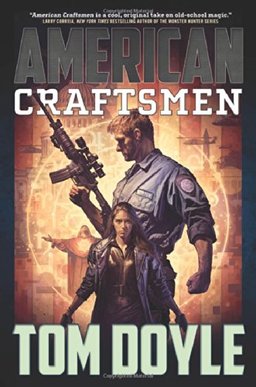The Series Series: American Craftsmen by Tom Doyle
 Oh, best and most delicious of conspiracy-theory secret histories! From the first moment I heard the premise of American Craftsmen, I knew I would love this book. I am glad to report that it was even better than I imagined — smarter, funnier, more multi-layered and suspenseful, with even more kickass action.
Oh, best and most delicious of conspiracy-theory secret histories! From the first moment I heard the premise of American Craftsmen, I knew I would love this book. I am glad to report that it was even better than I imagined — smarter, funnier, more multi-layered and suspenseful, with even more kickass action.
Tom Doyle’s craftsmen are mages whose lineages have served in defense of our nation since George Washington bound them in a secret Compact. As the novel opens, with a craft op gone wrong in Iraq, old feuds between the Fighting Families and classic turf wars among occult branches of government bureaucracies threaten the United States from within.
Our hero Dale Morton gets hit with the triple-whammy of a dying foe’s curse, a case of straight-up PTSD, and subtle undermining by a mole who has infiltrated America’s supernatural defense forces. Whoever wants Morton out of the way is up to no good, so Morton leaves the Army to save it. His inner life is painstakingly honorable, but his environment is so full of intrigue that he has needed to cultivate his own devious tendencies and sufficient gallows humor to get himself through the day. He cunningly gives every appearance of going home to lick his wounds. Meanwhile, he works out how he’ll get a crack at the traitor hiding among his former comrades-at-arms.
The House of Morton itself is a House divided. Dale is the only living member of the household, and his numerous resident ghosts form rival camps around the sorcerous styles of Hawthorne and Poe. He knows how to recognize the cruel magics of the Left-Hand Path, because he grew up literally haunted by its most famous practitioners. Like every virtuous member of the Morton family for a century and a half, Dale has dedicated himself to the line of protective ancestors and pitted himself against the wicked ancestors his peers in the service will never let him live down.
Unlikely alliances fill American Craftsmen and that’s one of the most delightfully American things about it. The Fighting Families of the Compact — all based on real historical figures — include lines like Morton’s that mix Native American ancestry and practice with the pagan folk traditions of rural England, alongside Puritan lines like that of the sanctimonious but well-intentioned Michael Endicott, and old-school heretics like their commanding officer, a descendant of the matrilineal Hutchinsons. (You don’t need to remember a lot of American history and American literature to enjoy this novel, but anything you happen to remember will be repaid in delight. Likewise Washington local color. I’ve lived many years in the DC area and it really shows that Doyle lives in the District. No cardboard cutouts here, not for landmarks or characters.) Dale Morton’s love interest is the very modern daughter of Iranian exiles smuggled out of the old country by the CIA. Scherezade knows nothing about the secret world of magical craft that is Dale’s life. He fears telling her the truth almost as much as he hates lying to protect her. This is no time to start a courtship, when he’s pursuing a patriotic duty that looks a lot like treason, but once Dale’s enemies choose Scherezade as a target, he commits absolutely to saving her. Scherie’s worth saving — clever, resourceful, and adaptable, with a balance of ferocity and innocence that felt believably destabilized by her first close-in experiences with violence.

To lure his enemies into the open, Dale throws a literal party they’ll be sure to crash. All the factions show up, and the ensuing chaos is by turns comical, harrowing, moving, and cinematically explosive. The scene is a perfectly paced set piece that can stand with the finest in the genre. The Fall of the House of Morton turns loose the ancestral ghosts in all their Poevian glory.
Dale and Scherie flee the wreckage and the party guests in a road trip that tests and deepens their relationship. To those who suspect him of madness and worse, Dale’s release of the Left-Hand spirits is just the evidence they need to justify sending the world’s most ruthless mage hunters after him.
The hunters force them to a Sanctuary that is the home for all of America’s lost things. Here we see again Tom Doyle’s consummate storytelling skill. Through the Sanctuary chapters, he walks an authorial tightrope. Lean too far one way, and Sanctuary will be a mawkish place full of cheap sentiment; lean too far the other, and it will be bleak and dehumanizing. The lost things that take refuge there did not get lost through any gentle processes, after all. I found the tightrope walk successful, and heartbreaking as history.
It is no spoiler to say that our hero takes his fight to Washington and all the characters hunting or accompanying him take their fights there too. The stronghold Dale and Scherie finally storm is protected by a Probability Defense, a spell of vast power that responds to trespassers by throwing increasingly unlikely bits of bad luck in their paths. Every ally Dale can enlist, every inch of progress he can make, finds its balance in hilariously brazen manifestations of Murphy’s Law, all of them exploited by enemies who stand revealed and desperate. Those are some profoundly disturbing enemies, and all I will say about them beyond that is, if you were looking for an excuse to reread some Poe short stories, right before or after reading American Craftsmen would be a fine time to do so. All victories are hairsbreadth victories, and hard-earned.
This volume wraps up enough of its loose ends to be entirely satisfying and leaves enough big conflicts unresolved to make a sequel or several feel like an excellent prospect. It’s a fun book of genuine depth, a book absolutely of the present moment with its roots running back to the earliest colonial days and beyond. American Craftsmen vies with Sebastien de Castell’s Traitor’s Blade for position as my favorite book of 2014. I can’t wait to see what Tom Doyle does next.
Sarah Avery’s short story “The War of the Wheat Berry Year” appeared in the last print issue of Black Gate. Her contemporary fantasy novella collection, Tales from Rugosa Coven, follows the adventures of some very modern Pagans in a supernatural version of New Jersey even weirder than the one you think you know. The Trafficking in Magic, Magicking in Traffic anthology she coedited with David Sklar includes stories from James Enge, Elizabeth Bear, and Darrell Schweitzer. You can keep up with her at her website, sarahavery.com, and follow her on Twitter.
Read Tom Doyle’s post for Black Gate, “Putting the Epic into Modern Day Fantasy.”